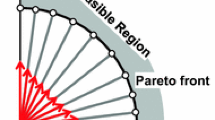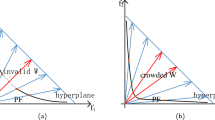Abstract
The Multi-Objective Evolutionary Algorithm based on Decomposition (MOEA/D) is a popular algorithm for solving Multi-Objective Problems (MOPs). The main component of MOEA/D is to decompose a MOP into easier sub-problems using a set of weight vectors. The choice of the number of weight vectors significantly impacts the performance of MOEA/D. However, the right choice for this number varies, given different MOPs and search stages. We adaptively change the number of vectors by removing unnecessary vectors and adding new ones in empty areas of the objective space. Our MOEA/D variant uses the Consolidation Ratio to decide when to change the number of vectors and to decide where to add or remove these weighted vectors. We investigate the effects of this adaptive MOEA/D against MOEA/D with a poorly chosen set of vectors, a MOEA/D with fine-tuned vectors and MOEA/D with Adaptive Weight Adjustment on two commonly used benchmark functions. We analyse the algorithms in terms of hypervolume, IGD and entropy performance. Our results show that the proposed method is equivalent to MOEA/D with fine-tuned vectors and superior to MOEA/D with poorly defined vectors. Thus, our adaptive mechanism mitigates problems related to the choice of the number of weight vectors in MOEA/D, increasing the final performance of MOEA/D by filling empty areas of the objective space and avoiding premature stagnation of the search progress.
Access this chapter
Tax calculation will be finalised at checkout
Purchases are for personal use only
Similar content being viewed by others
Notes
- 1.
In the case of discontinuous PF case, there is no need to cover the discontinuity area.
- 2.
- 3.
For the HV calculation, we use the reference point set to (1 + 1/H,1 + 1/H) for two objective problems and (1 + 1/H, 1 + 1/H, 1 + 1/H) for three objective problems.
- 4.
We initialize the weight vectors using the Simplex-lattice Design (SLD) method, causing the number to slightly change between MOPs with 2 and 3 objectives.
References
Črepinšek, M., Liu, S.H., Mernik, M.: Exploration and exploitation in evolutionary algorithms: a survey. ACM Comput. Surv. (CSUR) 45(3), 1–33 (2013)
Deb, K., Thiele, L., Laumanns, M., Zitzler, E.: Scalable multi-objective optimization test problems. In: Proceedings of the 2002 Congress on Evolutionary Computation. CEC 2002 (Cat. No.02TH8600), vol. 1, pp. 825–830, (2002). https://doi.org/10.1109/CEC.2002.1007032
Farhang-Mehr, A., Azarm, S.: Diversity assessment of Pareto optimal solution sets: an entropy approach. In: Proceedings of the 2002 Congress on Evolutionary Computation. CEC 2002 (Cat. No.02TH8600), vol. 1, pp. 723–728. (2002). https://doi.org/10.1109/CEC.2002.1007015
de Farias, L.R.C., Braga, P.H.M., Bassani, H.F., Araújo, A.F.R.: MOEA/D with uniformly randomly adaptive weights. In: Proceedings of the Genetic and Evolutionary Computation Conference, pp. 641–648. GECCO 2018, Association for Computing Machinery, New York, NY, USA (2018). https://doi.org/10.1145/3205455.3205648
Glasmachers, T., Naujoks, B., Rudolph, G.: Start small, grow big? Saving multi-objective function evaluations. In: Bartz-Beielstein, T., Branke, J., Filipič, B., Smith, J. (eds.) PPSN 2014. LNCS, vol. 8672, pp. 579–588. Springer, Cham (2014). https://doi.org/10.1007/978-3-319-10762-2_57
Goel, T., Stander, N.: Non-dominance-based online stopping criterion for multi-objective evolutionary algorithms. Int. J. Numer. Meth. Eng. 88, 661–684 (2010)
Jiang, S., et al.: Towards adaptive weight vectors for multiobjective evolutionary algorithm based on decomposition. In: 2016 IEEE Congress on Evolutionary Computation (CEC), pp. 500–507 (2016). https://doi.org/10.1109/CEC.2016.7743835
Lavinas, Y., Aranha, C., Ladeira, M., Campelo, F.: MOEA/D with random partial update strategy. In: 2020 IEEE Congress on Evolutionary Computation (CEC), pp. 1–8 (2020)
Li, H., Zhang, Q.: Multiobjective optimization problems with complicated pareto sets, MOEA/D and NSGA-II. IEEE Trans. Evol. Comput. 13(2), 284–302 (2009). https://doi.org/10.1109/TEVC.2008.925798
Li, M., Yao, X.: What weights work for you? Adapting weights for any pareto front shape in decomposition-based evolutionary multiobjective optimisation. Evol. Comput. 28(2), 227–253 (2020)
Ma, X., Yu, Y., Li, X., Qi, Y., Zhu, Z.: A survey of weight vector adjustment methods for decomposition based multi-objective evolutionary algorithms. Evol. Comput. 24(4), 634–649 (2020)
Qi, Y., Ma, X., Liu, F., Jiao, L., Sun, J., We, J.: MOEA/D with adaptive weight adjustment. Evol. Comput. 22(2), 231–264 (2014)
Tanabe, R., Ishibuchi, H., Oyama, A.: Benchmarking multi- and many-objective evolutionary algorithms under two optimization scenarios. IEEE Access 5, 19597–19619 (2017)
Wagner, T., Trautmann, H., Naujoks, B.: OCD: online convergence detection for evolutionary multi-objective algorithms based on statistical testing. In: Ehrgott, M., Fonseca, C.M., Gandibleux, X., Hao, J.-K., Sevaux, M. (eds.) EMO 2009. LNCS, vol. 5467, pp. 198–215. Springer, Heidelberg (2009). https://doi.org/10.1007/978-3-642-01020-0_19
Zhang, Q., Li, H.: MOEA/D: a multiobjective evolutionary algorithm based on decomposition. IEEE Trans. Evol. Comput. 11(6), 712–731 (2007)
Zitzler, E., Deb, K., Thiele, L.: Comparison of multiobjective evolutionary algorithms: empirical results. Evol. Comput. 8(2), 173–195 (2000)
Author information
Authors and Affiliations
Corresponding author
Editor information
Editors and Affiliations
Rights and permissions
Copyright information
© 2021 Springer Nature Switzerland AG
About this paper
Cite this paper
Lavinas, Y., Teru, A.M., Kobayashi, Y., Aranha, C. (2021). MOEA/D with Adaptative Number of Weight Vectors. In: Aranha, C., Martín-Vide, C., Vega-Rodríguez, M.A. (eds) Theory and Practice of Natural Computing. TPNC 2021. Lecture Notes in Computer Science(), vol 13082. Springer, Cham. https://doi.org/10.1007/978-3-030-90425-8_7
Download citation
DOI: https://doi.org/10.1007/978-3-030-90425-8_7
Published:
Publisher Name: Springer, Cham
Print ISBN: 978-3-030-90424-1
Online ISBN: 978-3-030-90425-8
eBook Packages: Computer ScienceComputer Science (R0)




